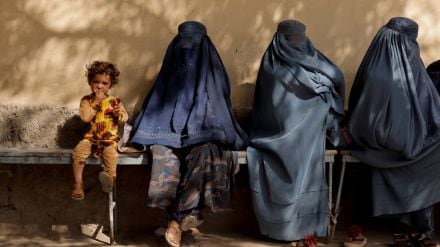Women in the Afghan city of Herat have been told to wear a burqa, a full Islamic veil that covers the entire body and face, if they want to enter public health facilities, according to Médecins Sans Frontières (MSF), cited by the BBC. According to the medical charity, the new rule came into effect on 5 November, and it is already having a visible impact on women’s access to healthcare. A spokesman for the Taliban denied the claims, calling the report “false.”
“This is totally false. The position of the vice and virtue ministry is generally on the wearing of hijab,” said Saif-ul-Islam Khyber, a Taliban official, in a statement to the BBC.
Taliban denies burqa rule for Women at Health Centres
Sarah Chateau, MSF’s programme manager in Afghanistan, told the BBC that the restrictions were making life harder for women and stopping them from receiving medical treatment. “These restrictions further impede women’s lives and limit women’s access to health care,” she said, adding that even women needing urgent medical help were barred from entering the hospital premises if they were not wearing a burka.
The charity supports paediatric services at the Herat Regional Hospital. In the first few days after the rule was enforced, MSF recorded a 28% drop in emergency admissions. According to Chateau, the Taliban guards have been stationed at the hospital’s entry point, refusing grant entry to those without the burqa.
Speaking to the BBC, a spokesman for the Taliban’s Ministry for the Propagation of Virtue and Prevention of Vice, which enforces religious laws, denied the claim that women were being forced to wear the burqa explained that the word “hijab” can vary in interpretation across regions, adding that many local practices do not align with Sharia law. The official also rejected reports that women had been banned from entering medical centres for not wearing burqas. “Hijab is interpreted differently in different parts of the country, most of which are in conflict with Sharia [law],” said Saif-ul-Islam Khyber to the BBC.
Despite official denials, activists and residents in Herat province told the BBC that the rule is being followed. One female activist said that women have been required to wear burqas not only at hospitals but also in schools and government offices over the past week. The Taliban first made the burqa mandatory for women during their earlier rule in the 1990s. After returning to power in August 2021, the group imposed a series of restrictions on women’s rights, including bans on higher education, most workplaces, and secondary schools for girls, based on their interpretation of Islamic Sharia law.
In 2022, the Taliban issued a decree advising women to wear a burqa in public. At the time, officials called it “advice,” not an order. However, Chateau said the situation in Herat marks the first real enforcement of the burka rule. “Even though the veil edit was announced earlier, this is the first time we are seeing the enforcement of the burqa in Herat. In the past few days more and more women are coming to the hospital with burkas,” she told BBC.
Global reaction and UN concern
The United Nations has repeatedly accused the Taliban of practising “gender apartheid.” It has urged the group to lift restrictions on women and restore their rights. Just last week, the UN suspended operations at the Islam Qala border crossing between Afghanistan and Iran, after Afghan women were barred from working there.
